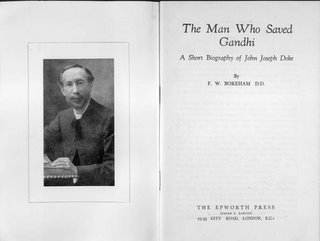 At last, convinced that two years spent in the dry air of the African Karoo had patched up the holes in his lungs, he married a very charming girl at Graaf-Reinet and returned to England to succeed his father at his birthplace. After two years at Chuddigh and five at Bristol, he turned his face to the Antipodes. And so we met. At first glance we felt sorry for him. He was so small and so frail; he looked at times as if a puff of wind would blow him away. His asthma racked him pitilessly, day and night. Yet he never behaved as a sick man; never, if he could possibly help it, referred to his weakness. In all his movements he was brisk, vigorous, sprightly. He thought health; assumed health; radiated health. He emerged from his room every morning with the sunniest of smiles; whilst, long before breakfast was over, his clever witticisms and excellent stories would have everybody in the best of humour. His comments on the morning's paper represented a liberal education. His mind was so richly stored that every item in the news drew from him striking comparisons and dramatic contrasts gathered from the storied past.
At last, convinced that two years spent in the dry air of the African Karoo had patched up the holes in his lungs, he married a very charming girl at Graaf-Reinet and returned to England to succeed his father at his birthplace. After two years at Chuddigh and five at Bristol, he turned his face to the Antipodes. And so we met. At first glance we felt sorry for him. He was so small and so frail; he looked at times as if a puff of wind would blow him away. His asthma racked him pitilessly, day and night. Yet he never behaved as a sick man; never, if he could possibly help it, referred to his weakness. In all his movements he was brisk, vigorous, sprightly. He thought health; assumed health; radiated health. He emerged from his room every morning with the sunniest of smiles; whilst, long before breakfast was over, his clever witticisms and excellent stories would have everybody in the best of humour. His comments on the morning's paper represented a liberal education. His mind was so richly stored that every item in the news drew from him striking comparisons and dramatic contrasts gathered from the storied past.The outlook from each window captivated him. As often as not, he would draw his sketch-book from his breast pocket and limn some pretty peep that particularly took his fancy. His home was luxuriously beautified by the multitude of his oil-paintings. When he slipped out into the garden, every flower, insect and bird awoke his enthusiasm. He loved life -life in every form and phase. In his later days he established a little zoo of his own and filled the house with the strangest pets. He would tell me in his letters of his lemurs, his meercats and his monkeys, and of the many-coloured birds in his aviary. And, as though real life failed to satisfy him, he invaded the realm of fiction. He wrote two novels ‑stories of the Karoo, ‑ that, for mystery and adventure, have been compared with the fancies of Rider Haggard. His lust of life was insatiable. I seldom saw him without his camera. He was eager to perpetuate every scene that confronted him, every experience that befell him.
[To be continued]
F W Boreham


